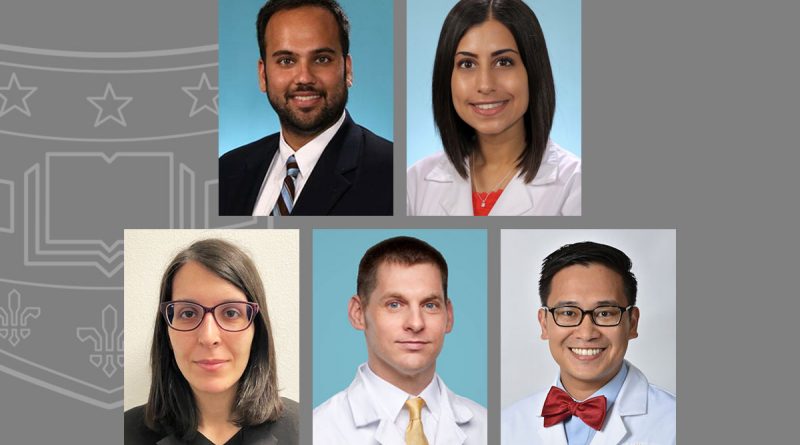5 physician-scientists named Dean’s Scholars
Physicians who engage in research play a vital role in developing novel, innovative approaches to diagnosing and treating disease. Nurturing the careers of doctors whose work takes them to both patients’ bedsides and the laboratory bench is a top priority of the Division of Physician-Scientists at Washington University School of Medicine in St. Louis.
Such was the genesis of WashU Medicine’s Dean’s Scholars initiative, established in 2020. The program provides funding and mentorship for up to two years to support early-career physician-scientists as they pursue lab research. The division recently announced its fourth class of Dean’s Scholars. They are: Amit Bery, MD; Lila Nolan, MD; Marilia Pinzone, MD; Andrew Roth, MD; and Brandon Tan, MD.
The Dean’s Scholars program also aims to help address a nationwide shortage of physician-scientists. The program’s support helps physicians integrate patient care with laboratory-based research so that doctors who identify pressing clinical questions can turn to the lab to find answers that help improve care for patients.
Only 1.5% of U.S. physicians conduct research, according to the Physician-Scientist Support Foundation, and this number has been declining due to numerous barriers. Most physician-scientist programs are comprised of individuals who hold both a medical degree and doctoral degree, but the Dean’s Scholars program exclusively supports physicians who only have medical degrees.
“We are thrilled to support these talented clinicians, who provide outstanding care at patients’ bedsides and want to engage in biomedical research,” said David H. Perlmutter, MD, executive vice chancellor for medical affairs, the George and Carol Bauer Dean of the School of Medicine, and the Spencer T. and Ann W. Olin Distinguished Professor. “Doctors on the front lines of caring for patients who also pursue research are uniquely placed to drive new discoveries to benefit patients, and this program helps provide the support they need to pursue this important career path.”
The program is funded by a Physician-Scientist Institutional Award from the Burroughs Wellcome Fund, a nonprofit organization that supports biomedical science through research and education. The School of Medicine and its departments also provide financial support for the program.
The new scholars were chosen after a competitive application cycle based on their commitment to research and the quality of their research proposals.
Bery, who studies lung transplant immunology, is an instructor in the Division of Pulmonary & Critical Care Medicine in the Department of Medicine. For his research project, he will investigate a specific molecule of the immune system and its role in preventing organ rejection following lung transplantation. His mentor is Daniel Kreisel, MD, PhD, the G. Alexander Patterson, MD/Mid-America Transplant Endowed Distinguished Chair in Lung Transplantation and director of the surgery department’s Lung Transplant Program.
Nolan, an instructor in the Division of Newborn Medicine in the Department of Pediatrics, is a neonatologist who cares for babies in the Neonatal Intensive Care Unit at St. Louis Children’s Hospital. She plans to investigate the impact of antibiotic exposure on immune signaling and the production of blood cells in the bone marrow. Her mentor is Megan Baldridge, MD, PhD, associate professor of medicine in the Department of Medicine’s Division of Infectious Diseases.
Pinzone, a clinical fellow in the Department of Medicine’s Division of Infectious Diseases, studies HIV reservoirs — infected immune cells where the virus exists but does not replicate. She plans to investigate how low levels of HIV in the blood may drive chronic inflammation that can contribute to health issues such as heart disease and neurocognitive disorders. Her mentor is Liang Shan, PhD, an associate professor of medicine in the Division of Infectious Diseases.
Roth, a postdoctoral research scholar in the Department of Medicine’s Division of Pulmonary & Critical Care Medicine, studies the interactions between immune cells in the lung and disease-causing bacteria. He plans to study the role of cholesterol modification during tuberculosis infection. His mentor is Jennifer Philips, MD, PhD, co-director of the Division of Infectious Diseases, and the Theodore and Bertha Bryan Professor of Environmental Medicine.
Tan, an instructor in the Department of Anesthesiology, studies the interactions of proteins and fats called lipids and their roles in regulating ion channels relevant in anesthesiology. Tan will investigate lipid regulation of the structure and function of a type of receptor that binds to serotonin. These receptors are important for treating anesthesia- and chemotherapy-related nausea. His mentor is Wayland Cheng, MD, PhD, an assistant professor in the Division of Cardiothoracic Anesthesiology.
“The Dean’s Scholars program is proving to be vital, as we had hoped, for supporting MD-only physician-scientists as they navigate this career path that is so important for nurturing the next generation of biomedical researchers who are physicians,” said Wayne M. Yokoyama, MD, director of the Division of Physician-Scientists, the Sam J. Levin and Audrey Loew Levin Professor of Arthritis Research, and an associate dean. “In particular, this program also can help MDs become more competitive in applying for career development awards from the National Institutes of Health (NIH) and other important funding sources.”
Source: Read Full Article
